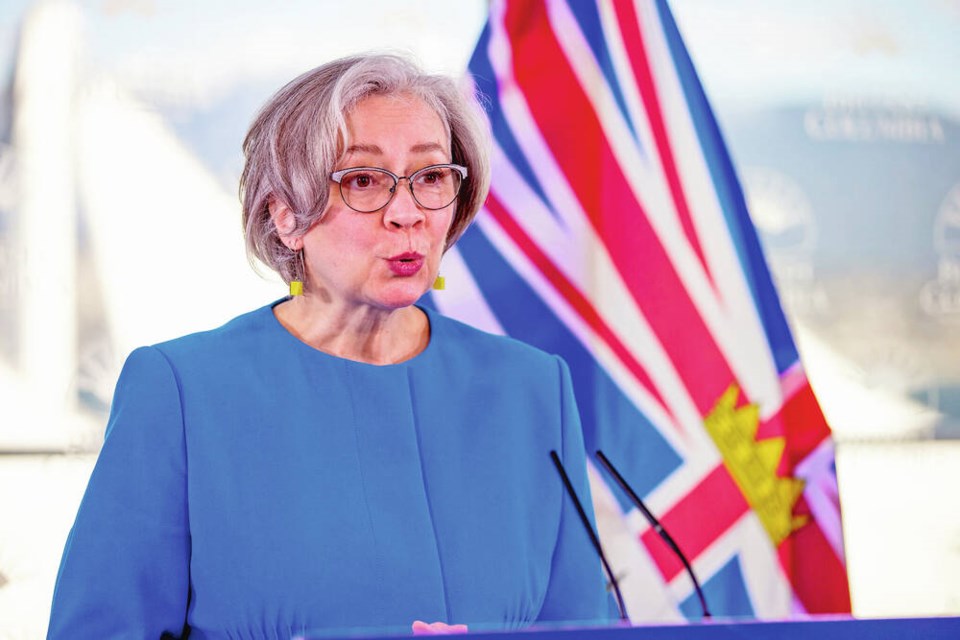No firm numbers are available yet, but student attendance is reported to be slightly below normal across the board for B.C. schools resuming classes this week after the holiday break.
“We’ll have a better sense, a much clearer picture over the next couple of days,” Education Minister Jennifer Whiteside said Tuesday.
Some parents have said they won’t be sending their children to school while COVID-19 cases remain high. Others who are sending their kids are worried about transmission as close to 600,000 students returned to class Monday.
“We’ve seen this in other restart periods, as well, where there’s in some cases with some parents a bit of holding back to see how things go before they test the waters,” Whiteside said. “I certainly understand that parents have very challenging decisions to make these days and they’re weighing up a lot of issues around bringing their kids back.”
The province has said that in place of contact tracing, if a school’s attendance levels drop by 10 per cent before normal, public health will be notified, along with the school community.
“There’s much more COVID in our communities, [so] it’s quite possible that that will show up in schools,” Whiteside said. “But there is such a number of cases that it’s very difficult now for public health to track down each individual case and contact trace.”
She said the education system is prepared to act if a school doesn’t have enough staff to run safely due to COVID-19 infections. The resulting “functional closure” could mean shutting down a classroom, a grade or a school, and moving to at-home learning for affected students.
Whiteside says local school administration officials, including principals, would make the decision about closing in-person classes and moving to temporary online teaching.
“Obviously the principals will be monitoring that very carefully and be in touch always with public health,” Whiteside said.
Two B.C. schools, in Hazelton and Surrey, have already stopped in-person classes, less than two days after most students returned to classrooms.
Ginger Fuller, secretary treasurer of the Coast Mountain School District, says officials will meet Wednesday to decide when to reopen Hazelton Secondary School to regular classes after it was closed because of a staff shortage, which was the result of “illness.”
The Education Ministry said the independent Bibleway Christian Academy in Surrey has also suspended in-person classes.
Whiteside said teachers began preparing for the possibility of functional closures last week, when students’ return to the classroom was delayed.
“Teachers have prepared learning packages, they’ve organized their modules. Hopefully within a fairly short period, students will be able to access their at-home learning resources and go from there.”
That could mean disruption for parents, but hopefully it would be for only a short amount of time, said Whiteside, adding learning at school remains the goal.
“Education is a fundamental public good and very, very important for intellectual, social and emotional development of kids.”
Meanwhile, with the one-dose COVID-19 vaccination rate for five- to 11-year-olds at 48 per cent in Island Health and 40 per cent across the province, there have been calls for vaccine clinics to be held in schools — something Whiteside said has been happening for 12- to 17-year-olds in some parts of the province.
Some say school-based clinics for younger children would encourage vaccination because they’re more convenient for parents.
“We generally are leaving it to the experts to determine what is the best way to organize those clinics,” Whiteside said. “I think it’s important to note that in terms of the vaccine for five- to 11-year-olds, public health has organized specialty clinics that are very particularly family-friendly.
“That’s why five- to 11-year-olds can’t go to a regular clinic or a booster clinic to get their vaccine. Their families are asked to go to the specially designed clinics.”
To date, none of the province’s 60 school boards have opted to make vaccination mandatory for staff, although the Sooke School District has said that all newly hired employees must be vaccinated.
“We’ve had about a third of boards so far determine that they will not be implementing a mandatory vaccination policy,” Whiteside said. “There are a number who are still having the conversation.”
jbell@timescolonist.com
— With files from The Canadian Press





